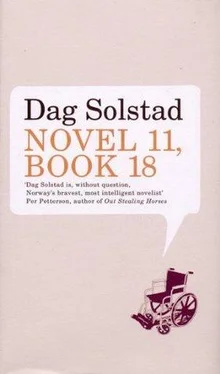Dag Solstad - Novel 11, Book 18
Здесь есть возможность читать онлайн «Dag Solstad - Novel 11, Book 18» весь текст электронной книги совершенно бесплатно (целиком полную версию без сокращений). В некоторых случаях можно слушать аудио, скачать через торрент в формате fb2 и присутствует краткое содержание. Год выпуска: 2011, Издательство: Random House, Жанр: Современная проза, на английском языке. Описание произведения, (предисловие) а так же отзывы посетителей доступны на портале библиотеки ЛибКат.
- Название:Novel 11, Book 18
- Автор:
- Издательство:Random House
- Жанр:
- Год:2011
- ISBN:нет данных
- Рейтинг книги:5 / 5. Голосов: 1
-
Избранное:Добавить в избранное
- Отзывы:
-
Ваша оценка:
- 100
- 1
- 2
- 3
- 4
- 5
Novel 11, Book 18: краткое содержание, описание и аннотация
Предлагаем к чтению аннотацию, описание, краткое содержание или предисловие (зависит от того, что написал сам автор книги «Novel 11, Book 18»). Если вы не нашли необходимую информацию о книге — напишите в комментариях, мы постараемся отыскать её.
He finds a fellow conspirator in Dr Schiøtz, who has a secret of his own and offers to help Bjørn carry his preposterous and dangerous plan through to its logical conclusion. However, the sudden reappearance of his son both fills Bjørn with new hope and complicates matters. The desire to gamble with his comfortable existence proves irresistible, however, taking him to Vilnius in Lithuania, where very soon he cannot tell whether he's tangled up in a game or reality.
Novel 11, Book 18
Novel 11, Book 18 — читать онлайн бесплатно полную книгу (весь текст) целиком
Ниже представлен текст книги, разбитый по страницам. Система сохранения места последней прочитанной страницы, позволяет с удобством читать онлайн бесплатно книгу «Novel 11, Book 18», без необходимости каждый раз заново искать на чём Вы остановились. Поставьте закладку, и сможете в любой момент перейти на страницу, на которой закончили чтение.
Интервал:
Закладка:
Her unfailing loyalty bound him to her. He experienced it as a clinch, but could do nothing about it. And he was glad to have her support, albeit suspicious. And when Turid continued so ardently to support the idea that the Kongsberg Theatre Society should really undertake the bold effort of staging Ibsen and then, during the rehearsals, eagerly worked at the role of Gina Ekdal, without any trace of glamour or festivity, his suspicion ceased. He now envisaged a collaboration, well, a camaraderie between them, which could become sufficiently deep to still the pain of awakening by her side in the morning and seeing her haggard face, without make-up. Indeed, he saw that she counted on it, saw it with his own eyes. Therefore he, too, decided to try. A life in seriousness and camaraderie within the framework of an amateur theatre society, the avatars of homo ludens in the god-forsaken provincial town of Kongsberg, where they would attempt a truly big effort. Until it turned out that the project itself did not work (and could never work), he could, in his marriage to Turid Lammers, discern the contours of an uncomplaining mature life, which did not tempt him, but which could ease the pain of that other thing, the unbearable sight, and the realisation that his whole life had been a pursuit of something that was destined to dissolve, because Nature has no mercy. He was glad to have Turid Lammers’s resigned, unfailing loyalty, which she offered with her exceptional and practised charm. But in reality he wanted to get away. That was what he wanted. He knew he could not ease the pain. But he was chained to her.
Then she did it, broke away, betraying him openly on the stage under the pretext of picking up the pieces of an amateur production. Was it worth it? Did she know what she was doing? How elated Turid was in that fateful moment! Her whole body trembled. Which only Bjørn Hansen (aka the tedious Hjalmar Ekdal) could notice, because he stood so close to her on the stage. Those quivering knees, that face touched with emotion, scenting the public’s favour for a fleeting moment. Turned inwards, moved, she was swathed in her own cheap success — this was Turid Lammers, excited, intoxicated, at any price. This was her pleasure. Bjørn Hansen was liberated from her at last. He knew in her moment of glory that he would no longer live with her at any price.
Nevertheless, two years went by before the final break. Because what was he to tell her? That he felt life had passed him by because he no longer found her face and body attractive? That he was unable to reconcile himself to the fact that her soft beauty had abandoned her for ever, leaving behind a woman for whom he felt nothing as she lay beside him in bed? For a man to see his wife in that way is unbearable and strikes him dumb. And so he remains stuck with her. The two years that went by before he managed to tear himself away from her were a total nightmare, which here will be passed over in silence.
Eventually he packed his earthly belongings and moved into a flat in a modern block in the centre of Kongsberg. By himself at last. He could catch his breath, walk about in his own living room and enjoy a quiet life. His flat was on the third floor; from the balcony he could see the railway station right below, to the left. The building and the tracks, which soon vanished from his sight as they merged into one, both in the north and south, circling Kongsberg in an attractive arc. In a way, Kongsberg was fenced in by the railway track, with the express passenger trains on their way to Kristiansand and Stavanger in one direction, Oslo in the other. Every evening just before midnight, the night train to Kristiansand and Stavanger stopped at the station. The train with its lowered window shades, the stillness. Not a sound coming from the station then, as opposed to when the trains stopped during the day and their arrivals were announced over the loudspeaker, which could be clearly heard in Bjørn Hansen’s living room, even on Sundays. From his balcony he could see, on the right, a corner of the river that flowed through the town. The river was called Lågen, and since its source was located far up on the Numedal plateaus, it was called Numedalslågen. Kongsberg is situated far inland, but Numedalslågen, which runs through the town, continues to flow, in zigzags and curves, mile after mile, until it finally reaches the coast at Larvik. The part Bjørn Hansen could see was quite peculiar, for right there sat three minuscule islands covered with tall pine trees, a sight that Bjørn Hansen liked very much, though most of all he would have wanted to see one of the many waterfalls Numedalslågen forms where it passes Kongsberg, forming another attractive arc. The arc the river makes is particularly attractive where it passes Old Kongsberg, with its seventeenth-century church, on a height, and the silhouette of three or four magnificent patrician buildings from the end of the eighteenth century. That view looked exceptionally good from up on the railway bridge, which had a pedestrian walkway beside the railway tracks that Bjørn Hansen was in the habit of including in his Sunday stroll, almost regardless of where else he had decided to go. Then, too, he could bend over the rusty barbed wire fence and look down on the river, at the black water, and study its reflections and ripples.
Incidentally, Bjørn Hansen would often take these Sunday walks with Herman Busk, the singing dentist. They tramped about in Kongsbergmarka, in the hills above the city, where they walked paths that led up to the peaks, to the popular Knutehytta, for example. They were both dressed in knickerbockers and anoraks, in the old-fashioned style, as they loafed about in the open and talked together. They were both middle-aged men, respected by the society in which they had long ago found their place. Herman Busk as dentist, Bjørn Hansen as treasurer. Sunday was the day for outings. Crowds of people on the paths in the hills above the old silver-mining town. Hikers. Both Bjørn Hansen and Herman Busk would constantly meet people they greeted before going on, or stopped to exchange a few words with, either Herman Busk or Bjørn Hansen, while the other remained standing alongside. They might be mutual acquaintances from the Society or people Bjørn Hansen knew from his occupation as treasurer, or clients of Herman Busk. When they returned to the town after their tramp, they would often go to Herman Busk’s house, where Mrs Busk awaited them with Sunday dinner. Or they parted company and went each to his own place. It was once a month or so that Bjørn Hansen was invited for Sunday dinner with the Busk family. He appreciated that, for nothing could be compared to returning from a long ramble in field and forest, entering the hallway of Herman Busk’s residence, and feeling the fragrance of the Sunday roast tickle one’s nostrils, as Bjørn Hansen also loudly proclaimed, in a way that delighted Herman Busk’s wife, Berit. But he made no fuss about dining alone either. On Sundays it happened quite frequently that he dined at the Grand Hotel, because its restaurant had an excellent kitchen, better than the old Kongsberg Pub, which had not regained its old-time excellence since its renovation after a fire some years ago. He liked to dine in restaurants on Sundays, alone, served by a polite waiter who knew him because he ate there so often. Then Bjørn Hansen would often sit and reflect on what he and Herman Busk had talked about while hiking along the paths in the heights above the town. They discussed a good amount of literature, because both of them were great readers. True, their tastes differed considerably, Herman preferring bulky, rather conventional novels, normally published by the Book Club, while Bjørn Hansen on the whole bought his books at the bookdealers’ annual giant sale, where the real goodies could be found. Therefore they could only seldom profitably discuss individual works, since Herman Busk had not read the books Bjørn Hansen had read, and Bjørn Hansen did not care for the books Herman Busk was reading. But he liked to listen to Herman Busk telling him about them, not least about why he appreciated them, perhaps not so much on account of the arguments or words he used, but because of the tone of voice, which indicated that they had a common frame of reference, even though both were alone vis-à-vis the other in regard to the great reading experiences they had within this common frame of reference. For the same reason Bjørn Hansen knew that Herman Busk understood him when he could proudly announce late one Sunday in the autumn as the trees were shedding their leaves and the paths were covered with yellow foliage, like a carpet (or like trash, if you preferred to see it that way), that now Camilo José Cela had received the Nobel Prize in Literature, for he had read a novel by Cela called The Family of Pascual Duarte . He had found it at the giant sale seven years ago, a single copy, which he alone had been interested in, though he got it for a song. Not many people in Norway had heard of Camilo José Cela, and no more than a couple of hundred copies were likely to have been sold, even though it had been available at the giant sale, and he was thus one of the two hundred. From interviews that Bjørn Hansen had read after Cela received the prize, he understood that few of the literary big shots who were interviewed had read anything by him. But one man at Kongsberg did know about him. The town treasurer at Kongsberg had discovered this novel, which had been spun from the head of a Spanish author of the highest quality, and that was something, eh? Where were the other two hundred readers? There must be several in our three largest cities, Oslo, Bergen and Trondheim, and among the two hundred there were most likely also Spanish-speaking individuals scattered about the far-flung country who had read it in Norwegian to check the translation, but if one could undertake an exact survey one would no doubt be in for a surprise. There was this one person at Kongsberg anyway, but Bjørn Hansen was certain that, in some little village or other in Norway, there was a cluster of Cela readers, at Geithus, for example. Geithus? Why not? There might very well be fifteen Cela readers at Geithus, that was how things were — the reading of certain novels is like an epidemic in miniature, a secret epidemic that suddenly breaks out in the strangest places while leaving others unaffected. ‘It was not that way before, but that’s how it is now,’ Bjørn Hansen said, talking excitedly because he was proud to be among the two hundred select members of the secret brotherhood that had read Camilo José Cela’s novel The Family of Pascual Duarte . ‘A sombre novel, by the way,’ Bjørn Hansen added, ‘it deals with an illiterate man who commits murder in cold blood; it’s a Spanish legend that says something about how people grow up in the scorched and cracked Extremadura landscape in Spain. But,’ he added meditatively, ‘was it sombre enough? I mean, I liked the book, but did it go deeply enough, I mean deeply enough into my own existence?’ After saying this he fell silent, nor did Herman Busk know what to say. They walked in silence side by side. That was how it mostly was — Bjørn Hansen’s tirade prompted by the award of the Nobel Prize to Cela being an exception rather than the rule; they tended to speak when they felt like it, often in such monologues, but mostly they walked side by side absorbed by their own thoughts, interrupted only when they had to return the friendly nods of passers-by. At the time when Cela received the Nobel Prize, however, Bjørn Hansen had been more reticent than usual, because he had developed an affliction that bothered him. His teeth had begun to give him pain. He was not sure when they had begun to do so; his teeth may have bothered him for a long time already without his being aware of it, until lately, when he had to face the fact that he would soon be fifty, had reached the summit and was about to begin the downhill run. But he was really worried about his teeth, which ached, or throbbed dully at any rate. He felt like mentioning it to Herman Busk, but decided he would not trouble him. Once a year Busk, the dentist, summoned him to an annual examination and carefully checked his teeth. Apart from that, they never talked about it. But now his teeth had started to hurt and the next consultation must be nine months away. Bjørn Hansen was really worried, not so much because of the pain, which he could easily tolerate, but because of what it signified. He was afraid that the pain meant that his teeth were falling out, coming loose from the gums and falling straight out, one after the other. Every so often he had to make an effort not to confide in Herman Busk concerning his worries. And this despite the fact that he knew, at least believed, that Herman would be annoyed if he knew he was going about in such an anxious state of mind and still decided not to have a good talk with him, Herman Busk, who would have immediately given him an appointment on Monday. But it was probably nothing, thought Bjørn. It’s just my imagination, it would be stupid to bother a friend with imaginary problems in his leisure time, he thought. And so they walked in silence beside one another on their hikes along the paths in Kongsbergmarka in the hills above the town. Interrupted by a remark or a long tirade. While Bjørn Hansen considered carefully, pro and con, whether or not to mention his worries about his teeth and, in the end, chose not to bother the dentist, he readily let his thoughts wander and his words flow on other matters, and then he would often say things that amazed Herman Busk. As when the town treasurer suddenly said that nearly all of the books he liked were merciless books that showed life to be impossible and contained a bitter black humour. In a way that was quite all right, revealing a side to his friend that Herman Busk recognised. But when he then added, ‘I’m getting tired of them now,’ and then explained this comment by adding that what he now wanted to read was a novel that showed life to be impossible, but without a trace of humour, black or otherwise, then Herman was taken aback and could think of nothing else to say aside from observing that there are certainly plenty of books without a trace of humour, whereupon Bjørn Hansen fell back and said he was damn right about that — ‘and they are all quite boring.’ But then they had reached town again and stepped out onto the old railway bridge, where they stood side by side leaning over the railing and staring down at the river below, before they continued along the walkway beside the railway track, turned off it to take a shortcut down into a densely built-up area and reached the street corner, where they either parted company and went their separate ways or proceeded together to Herman Busk’s residence, where Berit was waiting with her Sunday roast.
Читать дальшеИнтервал:
Закладка:
Похожие книги на «Novel 11, Book 18»
Представляем Вашему вниманию похожие книги на «Novel 11, Book 18» списком для выбора. Мы отобрали схожую по названию и смыслу литературу в надежде предоставить читателям больше вариантов отыскать новые, интересные, ещё непрочитанные произведения.
Обсуждение, отзывы о книге «Novel 11, Book 18» и просто собственные мнения читателей. Оставьте ваши комментарии, напишите, что Вы думаете о произведении, его смысле или главных героях. Укажите что конкретно понравилось, а что нет, и почему Вы так считаете.












